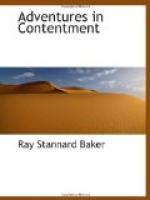It was a prime spring evening! The frogs were tuning up. I heard a drowsy cowbell somewhere over the hills in the pasture. The brown cow, with eager, outstretched neck, was licking her calf as it lay there on the improvised stretcher. I looked up at the sky, a blue avenue of heaven between the tree tops; I felt the peculiar sense of mystery which nature so commonly conveys.
“I have been too sure!” I said. “What do we know after all! Why may there not be future heavens and hells—’other heavens for other earths’? We do not know—we do not know—”
So, carrying the calf, in the cool of the evening, we came at last to my yard. We had no sooner put the calf down than it jumped nimbly to its feet and ran, wobbling absurdly, to meet its mother.
“The rascal,” I said, “after all our work.”
“It’s the nature of the animal,” said Mr. Purdy, as he put on his coat.
I could not thank him enough. I invited him to stay with us to supper, but he said he must hurry home.
“Then come down soon to see me,” I said, “and we will settle this question as to the existence of a hell.”
He stepped up close to me and said, with an appealing note in his voice:
“You do not really believe in a hell, do you?”
How human nature loves collusiveness: nothing short of the categorical will satisfy us! What I said to Mr. Purdy evidently appeased him, for he seized my hand and shook and shook.
“We haven’t understood each other,” he said eagerly. “You don’t believe in eternal damnation any more than I do.” Then he added, as though some new uncertainty puzzled him, “Do you?”
At supper I was telling Harriet with gusto of my experiences. Suddenly she broke out:
“What was his name?”
“Purdy.”
“Why, he’s the infidel that Mrs. Horace tells about!”
“Is that possible?” I said, and I dropped my knife and fork. The strangest sensation came over me.
“Why,” I said, “then I’m an infidel too!”
So I laughed and I’ve been laughing gloriously ever since—at myself, at the infidel, at the entire neighbourhood. I recalled that delightful character in “The Vicar of Wakefield” (my friend the Scotch Preacher loves to tell about him), who seasons error by crying out “Fudge!”
“Fudge!” I said.
We’re all poor sinners!
XI
THE COUNTRY DOCTOR
Sunday afternoon, June 9.
We had a funeral to-day in this community and the longest funeral procession, Charles Baxter says, he has seen in all the years of his memory among these hills. A good man has gone away—and yet remains. In the comparatively short time I have been here I never came to know him well personally, though I saw him often in the country roads, a ruddy old gentleman with thick, coarse, iron-gray hair, somewhat




